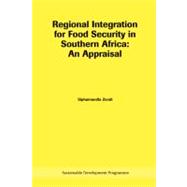Regional Integration for Food Security in Southern Africa : An Appraisal
, by ZONDI, SIPHAMANDLA- ISBN: 9780798301770 | 0798301775
- Cover: Paperback
- Copyright: 6/22/2005
"This volume provides a historical background and delves into the root causes of food insecurity in Southern Africa, identifying lessons learned and synthesising consensus behind past failures, in the hope of adopting new methods and policies to ensure the prospect of food security." "The food crisis in Southern Africa is compounded by socio-economic and environmental problems. The HIV/AIDS infection rates in the region are the highest in the world and have added to the agrarian crisis by diminishing the income-generating labour supply, thereby leading to a low production rate in an area already plagued by drought, famine and conflict. The possibility of recovery, from the advent of colonial capitalism and its legacy of legal, administrative and economic problems, to the state capitalism or command economy of post-independence leaders, with its own elite interests and import substitution policies, only fuelled the cycle of poverty in Southern Africa." "The viability of agriculture for economic growth is based on the fact that this sector provides a livelihood for 70% of the region's population. Nevertheless, the continent in general, has failed to produce enough food for consumption. The disequilibrium of expanding population growth has suffered at the hands of a stagnating and declining food crisis." "The advent of globalisation has also created an international atmosphere lacking in competitive production conditions for impoverished and underdeveloped nations, thereby highlighting the importance of regional integration for food security. The failures of many international food relief programmes and policies aimed at stabilising African economies has given impetus to regional integration, which may prove a way out for the current challenges faced by the Southern African Development Community (SADC) and the New Partnership for Africa's Development (NEPAD) in their quest to solve the problem of food accessibility and food security in Southern Africa."--BOOK JACKET.






